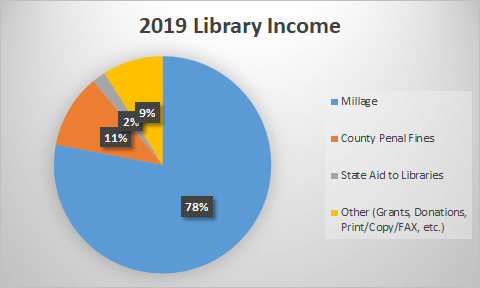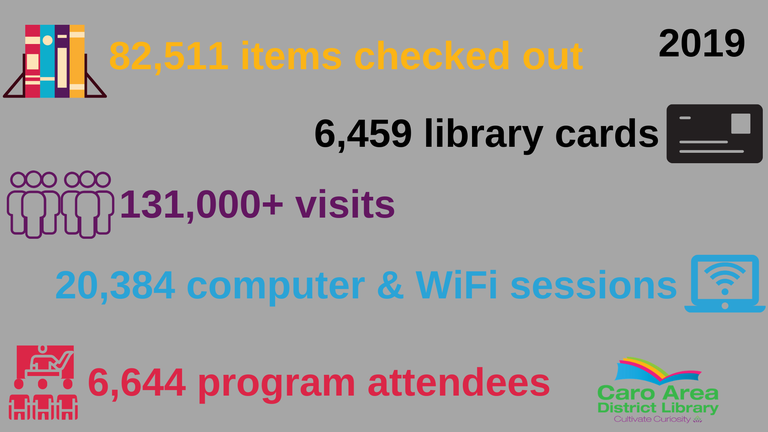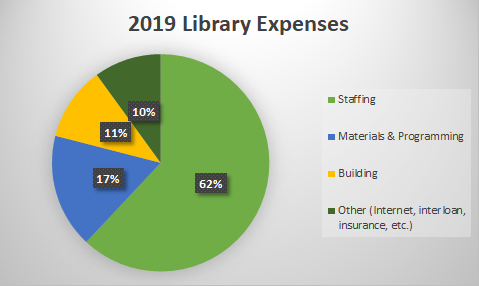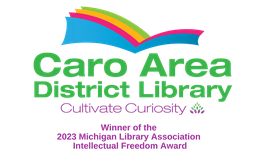August 2020 Millage Renewal Information
August 4, 2020 Operating Millage Renewal Information
This is a request to renew the millage of 1.4909 mills that was approved in 2010. If approved, the renewal will again be for a time frame of 10 years. This will not raise your taxes, it is a renewal at the same rate that you have been paying for the last ten years.
Ballot Language:
Shall the Caro Area District Library, County of Tuscola, State of Michigan, be authorized to levy annually an amount not to exceed 1.4909 mills ($1.4909 on each $1,000 of taxable value), which is a renewal of the previously authorized millage rate that expired in 2019, against all taxable property within the Caro Area District Library district for a period of ten (10) years, 2020 to 2029, inclusive, for the purpose of providing funds for all district library purposes authorized by law? The estimate of the revenue the Caro Area District Library will collect in the first year of levy (2020) if the millage is approved and levied by the District Library is approximately $432,000.
How the Library is Funded:

Millage - The local millage is a tax paid on property that is located inside the library district. The library district boundaries are complicated but the simplest way to explain is that if you live in the City of Caro, Almer, Ellington, Indianfields, Juniata, or Wells Township AND you are in Caro school district, then you are in the library district. The easiest way to see how much tax you paid for the library in 2019 is to look at your winter tax bill.
County Penal Fines - Penal fines that are collected in Tuscola County (for things like traffic tickets, court fines, etc.) are divided up by the count of all the people in Tuscola County and then the amount for those people are sent to the library that serves the area those people reside in. As of the 2010 Census data, our library services 11,816 patrons. Side note: penal fines income is expected to drop dramatically due to the stay at home orders of the COVID19 pandemic resulting in less traffic and court violations.
State Aid to Libraries - The State of Michigan allocates a small amount each year to help fund libraries. In 2019, we received 39.7 cents per person. Side note: due to the state budget shortfall because of the COVID19 pandemic, this is likely to be reduced further for 2021.
Other - We receive funding through grants, donations, copying/printing/faxing, test proctoring, and other small services provided at the library.
What the Money is Spent On:


Staffing - We employ 6 full time staff, 5 part time staff, and 6-8 substitutes. Our knowledgeable and experienced staff work at the front desk and children's desk, find items for patrons, help with computer skills, fax/copy/print. They select materials for purchase (both physical and electronic materials), schedule and conduct informational, educational, and recreational library programs, conduct early literacy activities such as story times, lead school tours, and assist with the Tuscola County Legal Help Center. They also process new and repair old library materials, pack/unpack and route thousands of interlibrary loan materials, catalog and distribute heirloom and open pollinated seeds for our seed library, and so much more.
Materials & Programming - We purchase books, audiobooks, movies, documentaries, magazines, newspapers, ebooks, eaudiobooks, digital magazines, digital comics/graphic novels, and more for circulation and use by our patrons. We offer informational, educational, and recreational programs for children, teens, and adults on a variety of subjects.
Building - The current library was built in 1978 and we expend funds for electricity, water, natural gas, phones, janitorial services, and maintenance, both inside and out.
Other - This category includes a variety of things that don't quite fit into the other categories. We pay for internet access for use in the building and also for WiFi inside and outside the building. We pay for the integrated library system that we use to catalog, track materials, and perform interlibrary loan. We pay for membership in our library cooperative, state library association, and for continuing education for our staff.
